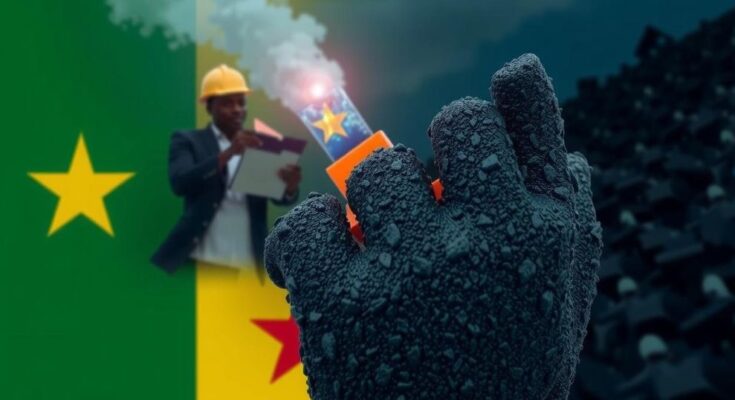Ghana’s illegal mining boom, known as galamsey, is becoming a central issue in the upcoming presidential election. In the face of rising unemployment and poverty, miners are extracting gold despite significant environmental consequences. The ruling party’s candidate, Vice President Mahamudu Bawumia, is pitted against former President John Mahama as voters seek solutions to this pressing crisis that threatens both agriculture and water supplies. Political pressure mounts for effective resolutions as public demonstrations grow in frequency.
In Ghana, the illegal mining activity, commonly referred to as galamsey, is becoming a significant concern in the context of the upcoming presidential election. Miners, driven by unemployment and poverty, work tirelessly under hazardous conditions to extract gold, while the environmental consequences mount. The tension surrounding this issue is palpable as voters prepare to elect a successor to President Nana Akufo-Addo. The ruling party’s candidate, Vice President Mahamudu Bawumia, faces competition from the opposition’s John Mahama, and the ramifications of illegal mining have emerged as a pivotal topic. Despite governmental promises to address galamsey, including past commitments made in 2017, the problem has only intensified, exacerbated by rising gold prices and unemployment rates.
The illegal mining industry contributes significantly to Ghana’s gold production and provides employment opportunities for over a million individuals, predominantly young men. However, this trade operates predominantly outside legal boundaries, resulting in environmental degradation and serious damage to the nation’s agriculture. Reports indicate that over 19,000 hectares of cocoa farmland have been destroyed, affecting a vital sector of Ghana’s economy. Furthermore, the pollution of water bodies threatens drinking water supplies for millions, as indicated by the Ghana Water Company Limited.
Frustrations among miners are mounting in light of government crackdowns, with many expressing the need for better job opportunities rather than coercive measures that destroy their means of livelihood. Activists and environmentalists are now pushing for political accountability, calling for concerted efforts to combat illegal mining while providing viable alternatives for miners. The upcoming election serves as a potential turning point, where the electorate can demand responsible solutions to the galamsey crisis, emphasizing the necessity for effective stakeholder engagement to preserve Ghana’s natural resources and heritage.
Ghana has witnessed a surge in illegal mining, popularly known as galamsey, which poses severe threats to the environment and agricultural sectors. The country, recognized as one of the largest gold producers, is grappling with the implications of this unregulated activity that not only endangers vital water resources but also results in significant loss of arable land. This mounting crisis is set against the backdrop of a national election, where the policies and attitudes of candidates towards illegal mining will likely influence voter decisions, particularly among the youth. The economic context, characterized by high unemployment and poverty levels, has driven many into illegal mining, leading to a systemic crisis that demands urgent attention from the government and political leaders.
The illegal mining crisis in Ghana reflects a complex interplay of economic necessity, environmental degradation, and political accountability. With the upcoming presidential election, voters are keenly aware of the implications of galamsey on their lives and the environment. Both candidates must address this pressing issue, ensuring that effective strategies, stakeholder engagement, and sustainable practices are at the forefront of their platforms. The acknowledgment of this issue as a priority will not only shape electoral outcomes but also dictate the future health and sustainability of Ghana’s natural resources and economy.
Original Source: www.barrons.com




